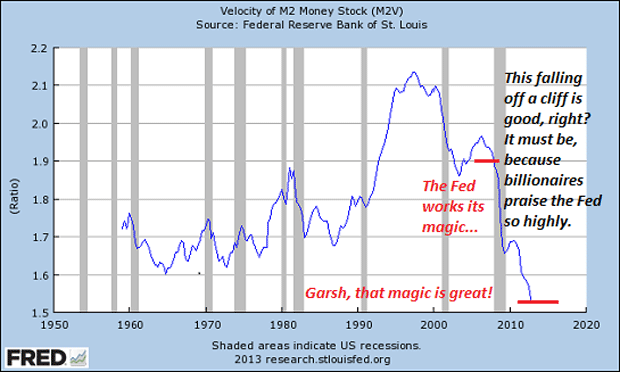Get the latest financial news, insights and expert analysis from our award-winning MoneyWeek team, to help you understand what really matters when it comes to your finances.
You are now subscribed
Your newsletter sign-up was successful
Want to add more newsletters?

Twice daily
MoneyWeek
Get the latest financial news, insights and expert analysis from our award-winning MoneyWeek team, to help you understand what really matters when it comes to your finances.

Four times a week
Look After My Bills
Sign up to our free money-saving newsletter, filled with the latest news and expert advice to help you find the best tips and deals for managing your bills. Start saving today!
Gold flat. Dow flat.
What's not flat?
Our friend Hugh Hendry. He's either up or down. No flatness for Hugh.
MoneyWeek
Subscribe to MoneyWeek today and get your first six magazine issues absolutely FREE

Sign up to Money Morning
Don't miss the latest investment and personal finances news, market analysis, plus money-saving tips with our free twice-daily newsletter
Don't miss the latest investment and personal finances news, market analysis, plus money-saving tips with our free twice-daily newsletter
Hugh has been among the most bearish of bears. But now he's become the most bullish of bulls. His fund, Eclectica, is losing money. Reluctantly, Hugh has capitulated.
Is he doing us all a favour? Is he the last one to throw in the towel', the last hold-out, signalling the end of the bull market? Maybe...
Hugh says he can't look at himself in a mirror. But he also can't sit out what could be a great bull market.
We watched Hugh debate another friend, Liam Halligan. Hugh's style includes mockery, condescension and insults. Very entertaining. You can look it up. Youtube has it.
Liam seems reasonable in contrast. Sensible. Well-intentioned. But no pushover for Hendry.
The subject on the table was the effect of quantitative easing (QE).
Liam said it would lead to inflation. He sees it already.
Hugh said it didn't work, that it wasn't leading to inflation at all, but to lower prices. Except for investment assets.
"Buy bonds!" said Hugh.
"Sell bonds!" said Liam.
Who will be right? Who knows?
Most likely, they're both right. In sequence. Hugh. Then, Liam. Or as we put it years ago: Tokyo, then Buenos Aires.
An Australian colleague, Vern Gowdie, is visiting us in Baltimore. We had almost the same conversation. It's probably the key conversation for investors, because it affects all your most important financial decisions.
"It looks like we could be in Tokyo for a long time," Vern concluded.
Tokyo has been in an off-again, on-again deflation for 23 years. It has tried bail-outs. Boondoggles. QE. And zero interest rate policy (ZIRP).
What has it got for all that? A stag-nation. It has tried to raise inflation rates without success. Instead, its zombie banks keep their money to themselves. Few new businesses are started up. People get older and spend less. The birthrate plummets, and the whole nation totters on, and on, and on.
We predicted the same thing for the US. But we thought it would happen faster.
Deleveraging would take seven years, we guessed. We are already in year six. Will it end next year? Doesn't look like it. Debt levels are actually higher if you include federal debt.
And since QE does not directly cause inflation, it could go on for years more as it has in Japan with no real result other than much higher government debt.
"QE", Hugh sneers, "doesn't work. And it won't work in the future. And it won't cause inflation. Under these conditions, I'll take a government bond with a 4% yield."
Want to see QE not working? Take a look at this. The Fed puts in money. It goes nowhere:

Source: research.stlouisfed.org
That's why Hugh might sit happily with his government bond for many years.
But not forever, of course. Eventually, lending against the future output of a slack economy will prove disastrous. But that is what happens when you finally get to Buenos Aires. That's when the government moves to "QE Plus": a strategy designed to bypass the banking system and get more money into more hands, faster.
It will happen. But it could be years ahead.
Get the latest financial news, insights and expert analysis from our award-winning MoneyWeek team, to help you understand what really matters when it comes to your finances.
MoneyWeek is written by a team of experienced and award-winning journalists, plus expert columnists. As well as daily digital news and features, MoneyWeek also publishes a weekly magazine, covering investing and personal finance. From share tips, pensions, gold to practical investment tips - we provide a round-up to help you make money and keep it.
-
 Should you buy an active ETF?
Should you buy an active ETF?ETFs are often mischaracterised as passive products, but they can be a convenient way to add active management to your portfolio
-
 Power up your pension before 5 April – easy ways to save before the tax year end
Power up your pension before 5 April – easy ways to save before the tax year endWith the end of the tax year looming, pension savers currently have a window to review and maximise what’s going into their retirement funds – we look at how

